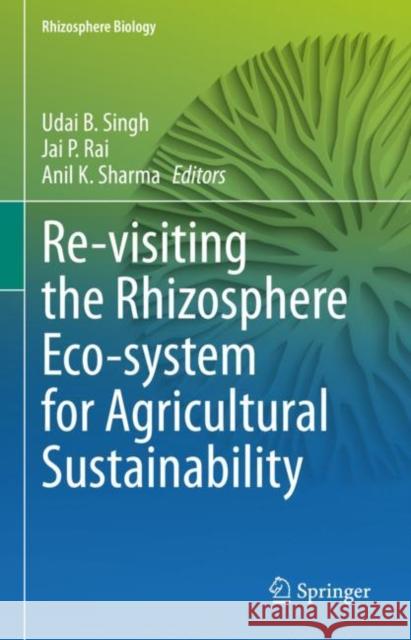Re-visiting the Rhizosphere Eco-system for Agricultural Sustainability » książka
Re-visiting the Rhizosphere Eco-system for Agricultural Sustainability
ISBN-13: 9789811941009 / Angielski / Twarda / 2022 / 537 str.
Re-visiting the Rhizosphere Eco-system for Agricultural Sustainability
ISBN-13: 9789811941009 / Angielski / Twarda / 2022 / 537 str.
(netto: 843,44 VAT: 5%)
Najniższa cena z 30 dni: 848,19
ok. 22 dni roboczych.
Darmowa dostawa!
The present book entitled, “Re-visiting the Rhizosphere Eco-system for Agricultural Sustainability” written by experts in the field, provides a comprehensive and consolidated state-of art overview of various aspects of rhizosphere biology, ecology and functioning. The role of rhizosphere microbial diversity in enhancing plant health and plant-microbe beneficial symbioses is discussed. Main topics include the diversity of plant-associated microbes in the rhizosphere, below-ground communication among the plant, soil, insects and microbes, rhizosphere ecosystem functioning, rhizosphere engineering, recruitment of microorganisms in the rhizosphere, mycorrhizal fungal symbiosis, positive interaction of the plants with the beneficial soil microorganisms for inducing the plant growth, conferring abiotic and biotic stress tolerance and modulating several pathways of the plants for the proper establishment and revitalization in the degraded and contaminated soils or negative likes the host-pathogen interactions leading to the disease development in plants. Further chapters focus on the role of signaling during the different stages of the plant-microbe coexistence, in symbiotic or pathogenic relationships, in quorum sensing, microbial signaling and cross-talk, bio-film formation, and antimicrobial peptides. The book also discusses the application of microbes in biodegradation of xenobiotic contaminants, bioremediation of heavy metals, sustainable agriculture and soil health, biological control of insect pests and plant pathogens, and the latest tools of omics which offer pioneering approaches to the exploration of microbial structure and function, secretome, holobiome, below-ground interaction, and microbial cooperation for sustainable food production and enhanced resource acquisition. Descriptions of cutting-edge techniques and novel approaches make this book unique in the area of rhizosphere biology. This is a useful reading material for researchers and students of microbiology, agriculture, ecology, and rhizosphser studies.
The present book entitled, “Re-visiting the Rhizosphere Eco-system for Agricultural Sustainability” written by experts in the field, provides a comprehensive and consolidated state-of art overview of various aspects of rhizosphere biology, ecology and functioning. The role of rhizosphere microbial diversity in enhancing plant health and plant-microbe beneficial symbioses is discussed. Main topics include the diversity of plant-associated microbes in the rhizosphere, below-ground communication among the plant, soil, insects and microbes, rhizosphere ecosystem functioning, rhizosphere engineering, recruitment of microorganisms in the rhizosphere, mycorrhizal fungal symbiosis, positive interaction of the plants with the beneficial soil microorganisms for inducing the plant growth, conferring abiotic and biotic stress tolerance and modulating several pathways of the plants for the proper establishment and revitalization in the degraded and contaminated soils or negative likes the host-pathogen interactions leading to the disease development in plants. Further chapters focus on the role of signaling during the different stages of the plant-microbe coexistence, in symbiotic or pathogenic relationships, in quorum sensing, microbial signaling and cross-talk, bio-film formation, and antimicrobial peptides. The book also discusses the application of microbes in biodegradation of xenobiotic contaminants, bioremediation of heavy metals, sustainable agriculture and soil health, biological control of insect pests and plant pathogens, and the latest tools of omics which offer pioneering approaches to the exploration of microbial structure and function, secretome, holobiome, below-ground interaction, and microbial cooperation for sustainable food production and enhanced resource acquisition. Descriptions of cutting-edge techniques and novel approaches make this book unique in the area of rhizosphere biology. This is a useful reading material for researchers and students of microbiology, agriculture, ecology, and rhizosphser studies.











